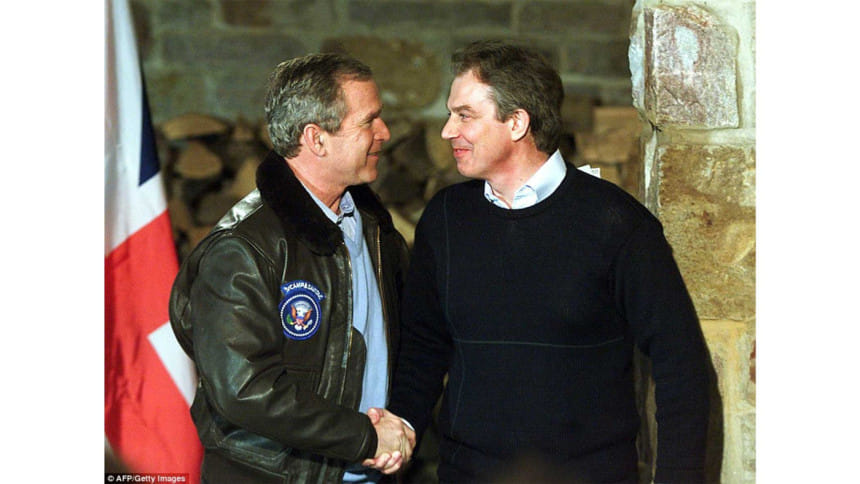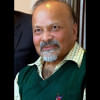9/11 anniversary, Afghanistan and values

"What goes around comes around" may be an apt and oft-used cliché, but in referencing 9/11 and Afghanistan, it only embitters. US President Joe Biden's withdrawal from "forever wars" was supported by 54 percent of US adults, according to a September 4 Pew survey. They were not pleased, by a 71 percent margin, with how Biden exited, and a whopping 69 percent acknowledged the 20-year failure of "Operation Enduring Freedom." In spite of deploying a NATO-based coalition (of over 40 countries), two of every three coalition fatalities were in no other uniform than that of the United States. Which is why when former UK Prime Minister Tony Blair dubs Biden's withdrawal as being "imbecilic," more cans of worms can be opened than not.
Blessed with the most "baby-faced," even impish, British chief executive looks (the youngest since Robert Jenkinson in 1812), Blair blazed into 10 Downing Street with "Third Way" reform promises. Only Margaret Thatcher rivals his three consecutive election victories. He won almost half the votes in 1997, nearly three-quarters in 2001, but his sinking 2005 popularity of 35 percent spoke volumes. No electoral defeat evicted him. His fall from grace was softened by a 1994 Granita Pact with Shadow Chancellor Gordon Brown. Both headed rival Labour factions, but if Labour won, they agreed Blair would hold the reins for two terms, then Brown.
Another "forever war," in Iraq, doomed Blair from 2003. Alone among European "powers," he supported US President George W Bush (Bush Junior), henceforth his "blood brother," to invade a country already defeated and dismantled in the January 1991 Desert Storm War. Bush Junior wanted to link 9/11 to Saddam Hussein, even though Britain and the United States supported him in the 1980s Iraq-Iran war. Bush Junior innocuously confessed to the press: Saddam "tried to kill my dad." The Vulcan Group ensured he never spoke his mind so freely again.
This Vulcan Group would meet in Montgomery, Alabama (so named because of a 1903-built statue of the Roman god of fire in the city). It was home to Condoleezza Rice, George HW Bush's (Bush Senior's) National Security Advisor on Soviet Union/East Europe. She parleyed with Bush Senior's Secretary of Defence Dick Cheney, President Gerald Ford's Secretary of Defence Donald Rumsfeld, Colin Powell (a Colonel under Rumsfeld in the late 1970s), an academic, Paul Wolfowitz (Bush Senior's Under Secretary for Defence), and Bush Senior's Presidential Special Negotiator Richard Armitage. James Mann incisively explains how they planned the Cold War from the 1970s. After winning the Cold War, they probed the nature of a "new world order."
Islam became the new villain, abetted by Israel. Ayatollah Ruhollah Khomeini's successful 1979 revolution became a strategic US loss. When Israel's 1982 Lebanon War evicted the Palestinian Liberation Organisation from the city, the Iran-backed Hezbollah picked up the anti-Israel mantle. Back in Washington, the 1953-founded American Israel Public Action Committee (AIPAC), which began successfully funding congressional candidates, suddenly burst into influencing policy-making circles with enormous clout. Its golden age would be to help Jared Kushner, President Donald J Trump's Assistant, Senior Advisor (2016-20), and son-in-law, snatch Palestinian land for Israeli settlers. All of these were unfolding when Samuel P Huntington's early 1990s book, Clash of Civilization and the Remaking of World Order, was souring western mindsets against immigrants. Hispanics and Muslims faced the brunt of public wrath. Bush Senior lost the 1992 election, thus postponing Vulcan plans, but when his son won in 2000, the setting changed. Bush Junior was, like Blair, the most "baby-faced" chief executive, but under him the Vulcan window flung too wide open for the world to not change.
Cold War-minded Vulcans overcame Baby Boomers at the turn of the century. Arguably the most respectable Republican president of the 20th Century, Dwight David Eisenhower, also seeking to halt "forever wars," made a sagacious 1961 Farewell Address prediction: "…we must guard against…unwarranted influence…by the military-industrial complex…[M]isplaced power exists and will persist." A decorated soldier whose World War II leadership salvaged an entire continent smacked the military where it hurts the most: right on the face.
Triumphant military-industrial partnerships left grave 9/11 footprints and potentially graver missing blanks. Reducing Afghanistan, Iraq, and Libya to rubbles exemplified the former: five weapons producing corporations earned 2.2 trillion USD just from the Afghanistan outlay (Boeing, General Dynamics, Lockheed, Northrop Grumman, and Raytheon). Question-marks accompany the latter: why were proportionately fewer executives killed in the 8:45-9:00am attacks in a trenchantly workaholic country inside a building catering mostly to executives (2,606 Twin Towers fatalities were largely service-workers from 77 countries); or how could Dulles International Airport become eerily silent on 9/10 night when it typically bustles with traffic; and did dumping Osama bin Laden's body into the Arabian Sea, much like opening the Guantanamo Bay prison camp, follow the essence of common law, as practiced in the United States?
Britain's knight-in-shining armour, Blair, whose "Third Way" honestly and successfully shifted the Labour Party's obsolete socialist platform towards the suddenly materialistic centre (as Bill Clinton did with his Democrats in the 1990s), was guest of honour in Bush Junior's first post-9/11 congressional speech. He elevated invisible ephemeral "western values" over tangible economic successes, stoking embedded anti-Islam and anti-immigrant European moods in the process. The long-term damage of empowering rudderless populists in the 1990s only stiffens their resolve today, irrevocably reconfiguring European political calculations.
French President Jacques Chirac and Germany's Chancellor Gerhard Schröder denounced the Anglo-American Iraqi invasion. Rumsfeld dismissed both as "old" Europe leftovers. Britain, one of Europe's most historically stooped countries, led its "new" Europe, with ostensibly "democratic" East European newcomers (Czech Republic, Hungary, and Poland). Blair's public approval fell to 27 percent when he left 10 Downing Street, but his "values" priority skyrocketed. It fed the Brexit psyche, European isolationism, and Muslim denigration (precisely when Muslims stand demographically taller and more inescapably European today).
A British public inquiry into the 2003 Iraq war causes (the 2009 Chilcot Report), concluded Britain was not threatened by Iraq. Even the International Court of Justice branded that war a crime (of aggression, since it was not in self-defence nor sanctioned by the United Nations). Future historians objectively assessing today's emergent populism might shed more light on which is worse: being "imbecilic," or practicing value-infused turncoat politics.
European anger at the United States for leaving Afghanistan is flat-footed. Europeans had 100-odd days after Biden's announcement until August 2021 to do something. They did nothing. As European and US citizens rivet against each other over populism, regionalism, and the Atlantic partnership, the bells may toll for the British-US "special relationship." Winston Churchill romanticised it during World War II, based upon sputtering ground-level dynamics on free-trade preferences and democracy/welfare gestures from a century earlier. Germany's 1871 creation further warmed Anglo-American relations (almost a century after Britain recognised the United States in 1785), but today's ebbing glow foretells uncertainty.
Inter-ethnic sparring inside Afghanistan hinders intra-cultural tussles, but the "forever wars" crippling Afghanistan, Iraq, and Libya leaves unquenched cokes. Other fires cannot but flare. Other countries cannot but fan them. We learned how: (a) filial or value-laden bondages rock the international relations boat more than an arms-race; and (b) without sturdier safeguards, we will never know if mature democratic countries are also wolves in sheep's clothing.
Dr Imtiaz A Hussain is the Head of Global Studies & Governance Program at Independent University, Bangladesh (IUB).

 For all latest news, follow The Daily Star's Google News channel.
For all latest news, follow The Daily Star's Google News channel. 



Comments